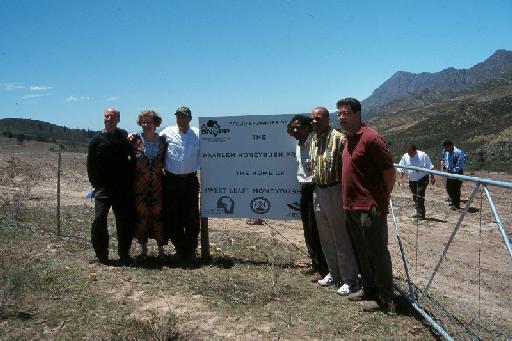|



|
Honeybush
tea plantation launched
 In
the tiny town of Haarlem in South Africa's beautiful Western
Cape province, a new crop is growing strong. After years of
planning and working with the local community, the South African
team of the A-SNAPP program (Agribusiness in Sustainable Natural
African Plant Products) began the first South African plantation
dedicated to cultivation of honeybush (Cyclopia spp).
Honeybush has always been a popular tea in South Africa, and
the plant has traditionally been collected from the wild. The
pioneering plantation will help assure that the market can be
expanded without endangering wild honeybush populations or depleting
raw material resources. The farmers involved have already signed
a contract with Cape Natural Tea Products, which has agreed
to purchase the first crop. In
the tiny town of Haarlem in South Africa's beautiful Western
Cape province, a new crop is growing strong. After years of
planning and working with the local community, the South African
team of the A-SNAPP program (Agribusiness in Sustainable Natural
African Plant Products) began the first South African plantation
dedicated to cultivation of honeybush (Cyclopia spp).
Honeybush has always been a popular tea in South Africa, and
the plant has traditionally been collected from the wild. The
pioneering plantation will help assure that the market can be
expanded without endangering wild honeybush populations or depleting
raw material resources. The farmers involved have already signed
a contract with Cape Natural Tea Products, which has agreed
to purchase the first crop.
Today, the first seedlings of this traditionally wild-harvested
plant can be seen growing on a 10 hectare (25 acre) plot tended
by 10 local farmers. In late November 2000, A-SNAPP officially
unveiled the plantation with a brief ceremony and ribbon cutting
by Jerry Brown of the US Agency for International Development
(USAID). USAID sponsors the A-SNAPP project, which is a collaborative
venture including the South African team (formerly with the
Agricultural Research Council of the Republic of South Africa,
or ARC), Rutgers University, and the Herb Research Foundation.
Ceremony attendees celebrated the unveiling of the new plantation
with honeybush tea tasting, South African sparkling wine, and
words of congratulations and thanks to those in the community
and their partners for the hard work that made it all possible.
Led by horticulturalist Elton Jefthas, A-SNAPP's South African
team researched honeybush propagation, conducted cultivation
trials, and investigated post-harvest processing methods. Working
with several communities, they helped collectors organize themselves
into growers' groups, creating new entrepreneurs in agribusiness.
The team was assisted in its efforts by the Department of Agriculture,
Western Cape, and ARC.
The Haarlem plantation is truly a community-based enterprise,
in which local farmers donated their labor to prepare the land
and plant 100,000 honeybush plants. The land, nestled high in
a mountain valley, was a gift of the local council, leased long-term
at low cost to give the community a secure place to bring this
valuable plant into cultivation and protect wild honeybush as
market demand increases. Cultivation of the plant will also
help reduce variations in the quality of the source material,
which is an issue with current wild-harvested sources. In addition,
as the market grows, collectors must go deeper into the wild
to find adequate supplies. The farther they must walk to collect
each kilo of raw material, the less cost-effective wild-harvesting
becomes.
Honeybush is indigenous to South Africa and grows nowhere else.
Its range is from Port Elizabeth to Cape Town and north to Clanwilliam,
but it is found only in specific mountainous areas. Like the
more famous South African bush tea, rooibos (Aspalathus linearis),
honeybush leaves are prepared through a fermentation process
similar to that used to produce black tea. The fermentation
that creates the unique color and flavor of honeybush tea is
a quick enzymatic process, rather than a microbial fermentation.
Honeybush has potent antioxidant properties, like green tea,
but unlike green tea, contains no caffeine and very low levels
of tannins, the compounds that make tea astringent and contribute
to its bitterness. - Rob McCaleb
An
International Training Program in New Crops: Aromatic, Botanical
and Medicinal Plants
From June 18-29, 2001 Rutgers University will host An International
Training Program in New Crops: Aromatic, Botanical and Medicinal
Plants. This intensive two-week seminar is chaired by A-SNAPP
partner member Dr. James Simon of Rutgers and co-sponsored by
the Herb Research Foundation. The program is designed for anyone
involved in new crop, product, or market development for the
natural products industry, and offers a broad-based, intensive
overview of production, processing, and marketing. This year,
program instructors include Herb Research Foundation president
Robert S. McCaleb; Varro Tyler, PhD of Purdue University; author
and industry consultant Steven Foster; Norman Farnsworth, PhD
of the University of Illinois at Chicago; Mark Blumenthal of
the American Botanical Council; and many other experts. For
more details on this highly relevant program, please view the
attached links:
An International
Training Program in New Crops: Aromatic, Botanical and Medicinal
Plants
ITP Registration
Form
Newsletter continued
on Next
Page
|
| |
 We
Want Your Input! We
Want Your Input!
The Herb Research
Foundation is pleased to present the latest issue of A-SNAPP
Update, an online newsletter for African growers and producers,
A-SNAPP partners, international buyers, and others interested
in the A-SNAPP project. We need your input to make A-SNAPP
Update a success! In particular, we are seeking stories
on individual African farms and businesses, traditional African
medicine, protection of endangered African plants, and other
issues important to you and your business. If you would like
to be profiled as a featured business in A-SNAPP Update
or have an idea for a story, please contact Margaret Blank at
mblank@herbs.org
|